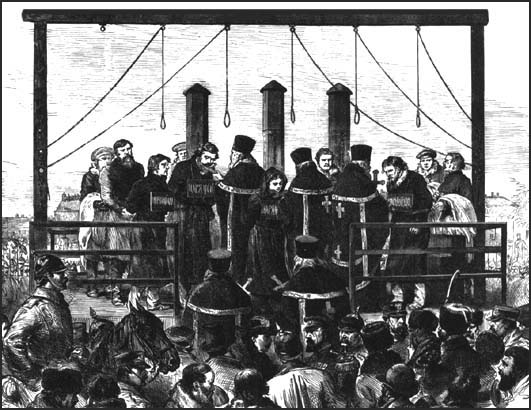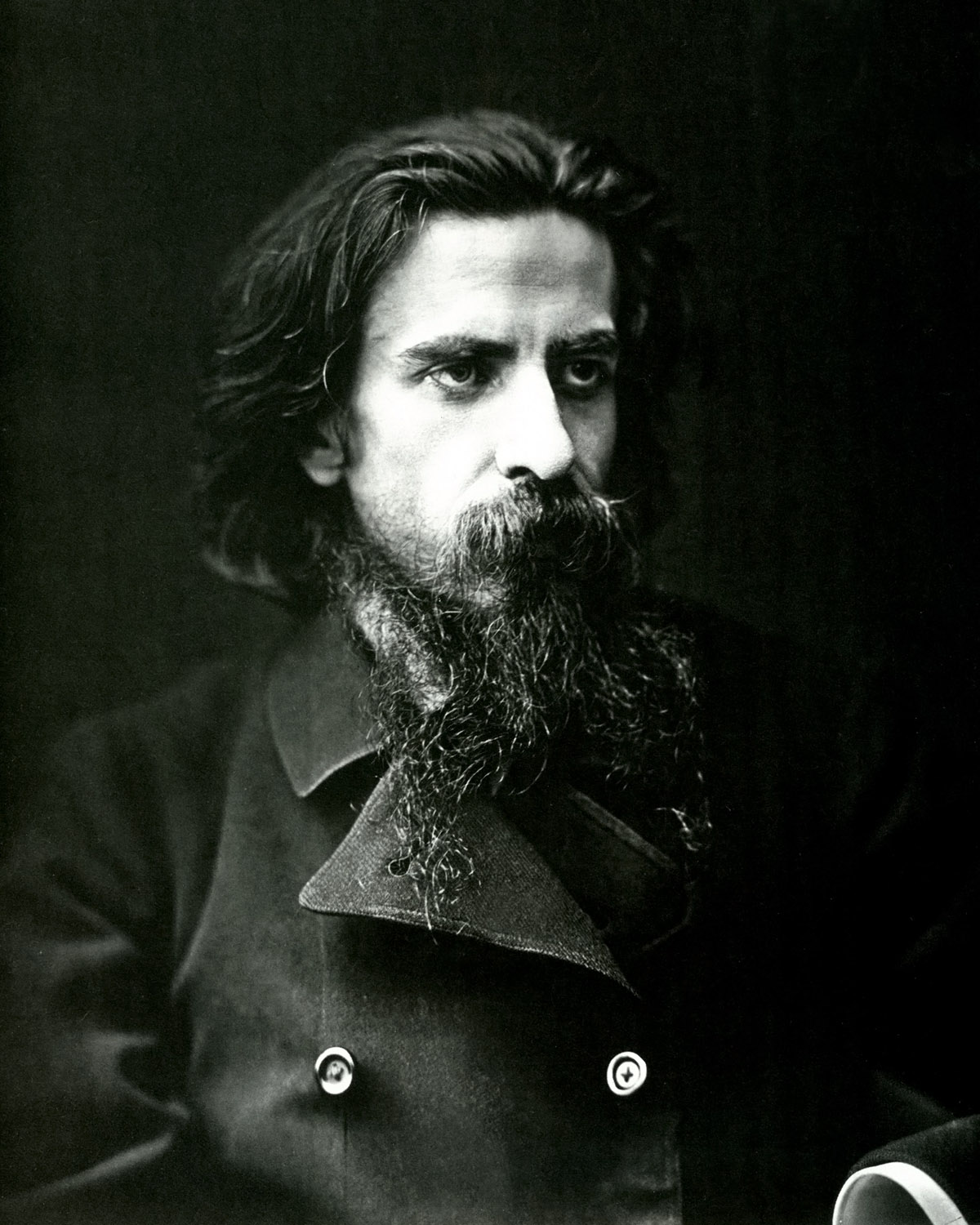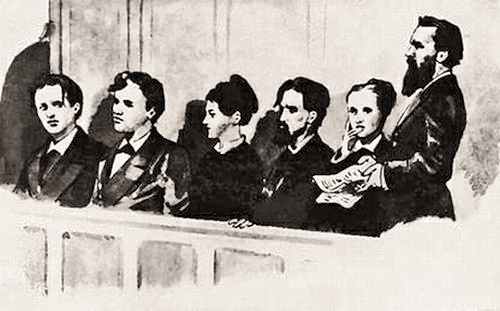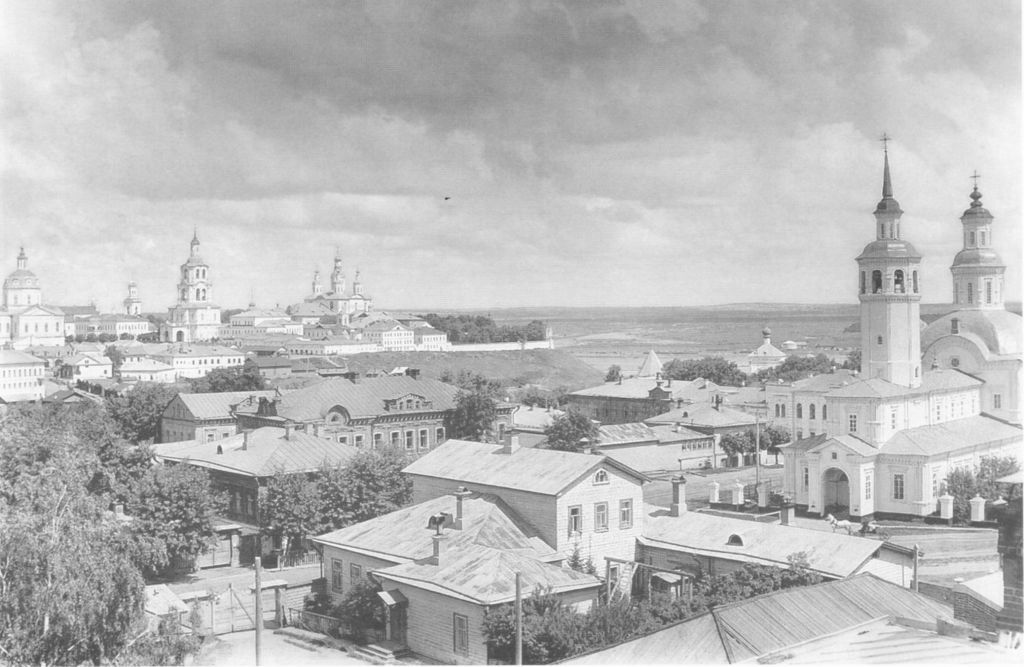|
Nikolai Rysakov
Nikolai Ivanovich Rysakov (russian: Николай Иванов Рысаков; – 15 April 1881) was a Russian revolutionary and a member of Narodnaya Volya. He personally took part in the assassination of Tsar Alexander II of Russia. He threw a bomb that disabled the Tsar's carriage. A second bomb by an accomplice, Ignacy Hryniewiecki, killed the Tsar. In his post-arrest confession, Rysakov revealed all that he knew of the organization, its personnel and its agenda. This resulted in numerous arrests, and seriously compromised the party's strength. Despite his repentance, he was hanged along with other accomplices. Biography Early life Nikolai Rysakov was born most likely in 1861 to Orthodox Christian parents Ivan Sergeevich Rysakov and Matrena Nikolaevna Rysakova at a sawmill plant in Belozersky district of Novgorod province. He had a brother Fedor and three sisters, Alexandra, Ljubica and Catherine. His family was originally from Tikhvin, and his father was the manager o ... [...More Info...] [...Related Items...] OR: [Wikipedia] [Google] [Baidu] |
Belozersky District, Vologda Oblast
Belozersky District (russian: Белозе́рский райо́н) is an administrativeLaw #371-OZ and municipalLaw #1107-OZ district (raion), one of the twenty-six in Vologda Oblast, Russia. It is located in the northwest of the oblast and borders with Vytegorsky District in the north, Vashkinsky District in the northeast, Kirillovsky District in the southeast, Cherepovetsky and Kaduysky Districts in the south, and with Babayevsky District in the west. The area of the district is . Its administrative center is the town of Belozersk.Resolution #178 Population: 21,648 ( 2002 Census); The population of Belozersk accounts for 55.7% of the district's total population. Geography The district is located southwest of Lake Beloye, with the southern half of the lake constituting a part of the district's territory. There are many smaller lakes within the district. The biggest of them are Lake Andozero, Lake Lozskoye, and Lake Vorbozomskoye. The entire district belongs to the b ... [...More Info...] [...Related Items...] OR: [Wikipedia] [Google] [Baidu] |
Timofei Mikhailov
Timofey Mikhailovich Mikhailov (russian: Тимофе́й Михайлович Мих́айлов; — 15 April 1881) was a member of the Russian revolutionary organization Narodnaya Volya. He was designated a bomb-thrower in the assassination of Tsar Alexander II of Russia, however he did not throw a bomb. Mikhailov, a discontented workman, claimed in his trial that he was motivated by a desire to improve the condition of the working classes. He was promptly condemned to death, and was hanged along with four other conspirators. Early life Mikhailov was born 1860 in Smolensk. His parents Mikhail Nefedov and Natalia Savelyeva were Orthodox peasants. He had sisters Malanya and Matrena, and brothers Grigory and Stepan. In 1875 Mikhailov moved to Saint Petersburg to earn a living. He worked as a boiler maker. Having worked in multiple plants, he left his last job in 1880 due to low wages. At this time, Mikhailov became involved in revolutionary politics and joined the Workers' Sec ... [...More Info...] [...Related Items...] OR: [Wikipedia] [Google] [Baidu] |
Eucharist
The Eucharist (; from Greek , , ), also known as Holy Communion and the Lord's Supper, is a Christian rite that is considered a sacrament in most churches, and as an ordinance in others. According to the New Testament, the rite was instituted by Jesus Christ during the Last Supper; giving his disciples bread and wine during a Passover meal, he commanded them to "do this in memory of me" while referring to the bread as "my body" and the cup of wine as "the blood of my covenant, which is poured out for many". The elements of the Eucharist, sacramental bread ( leavened or unleavened) and wine (or non-alcoholic grape juice), are consecrated on an altar or a communion table and consumed thereafter, usually on Sundays. Communicants, those who consume the elements, may speak of "receiving the Eucharist" as well as "celebrating the Eucharist". Christians generally recognize a special presence of Christ in this rite, though they differ about exactly how, where, and when Chr ... [...More Info...] [...Related Items...] OR: [Wikipedia] [Google] [Baidu] |
Execution Nikolai Kibalchich
Capital punishment, also known as the death penalty, is the state-sanctioned practice of deliberately killing a person as a punishment for an actual or supposed crime, usually following an authorized, rule-governed process to conclude that the person is responsible for violating norms that warrant said punishment. The sentence ordering that an offender is to be punished in such a manner is known as a death sentence, and the act of carrying out the sentence is known as an execution. A prisoner who has been sentenced to death and awaits execution is ''condemned'' and is commonly referred to as being "on death row". Crimes that are punishable by death are known as ''capital crimes'', ''capital offences'', or ''capital felonies'', and vary depending on the jurisdiction, but commonly include serious crimes against the person, such as murder, mass murder, aggravated cases of rape (often including child sexual abuse), terrorism, aircraft hijacking, war crimes, crimes against hum ... [...More Info...] [...Related Items...] OR: [Wikipedia] [Google] [Baidu] |
Leo Tolstoy
Count Lev Nikolayevich TolstoyTolstoy pronounced his first name as , which corresponds to the romanization ''Lyov''. () (; russian: link=no, Лев Николаевич Толстой,In Tolstoy's day, his name was written as in pre-reformed Russian. ; ), usually referred to in English as Leo Tolstoy, was a Russian writer who is regarded as one of the greatest authors of all time. He received nominations for the Nobel Prize in Literature every year from 1902 to 1906 and for the Nobel Peace Prize in 1901, 1902, and 1909; the fact that he never won is a major controversy. Born to an aristocratic Russian family in 1828, Tolstoy's notable works include the novels ''War and Peace'' (1869) and ''Anna Karenina'' (1878), often cited as pinnacles of realist fiction. He first achieved literary acclaim in his twenties with his semi-autobiographical trilogy, ''Childhood'', '' Boyhood'', and ''Youth'' (1852–1856), and '' Sevastopol Sketches'' (1855), based upon his experiences in ... [...More Info...] [...Related Items...] OR: [Wikipedia] [Google] [Baidu] |
Vladimir Solovyov (philosopher)
Vladimir Sergeyevich Solovyov (russian: Влади́мир Серге́евич Соловьёв; also romanized as Soloviev; – ), a Russian philosopher, theologian, poet, pamphleteer, and literary critic, played a significant role in the development of Russian philosophy and poetry at the end of the 19th century and in the spiritual renaissance of the early-20th century. Life and work Vladimir Solovyov was born in Moscow; the son of the historian Sergey Mikhaylovich Solovyov (1820–1879); his elder brother Vsevolod (1849-1903), became a historical novelist, and his younger sister, Polyxena (1867-1924), became a poet. Vladimir Solovyov's mother Polyxena Vladimirovna belonged to a family of Polish origin and had, among her ancestors, philosopher Gregory Skovoroda (1722–1794). In his teens, he renounced Eastern Orthodoxy for nihilism, but later his disapproval of positivism saw him begin to express views that were in line with those of the Orthodox Church. Fr ... [...More Info...] [...Related Items...] OR: [Wikipedia] [Google] [Baidu] |
Alexander III Of Russia
Alexander III ( rus, Алекса́ндр III Алекса́ндрович, r=Aleksandr III Aleksandrovich; 10 March 18451 November 1894) was Emperor of Russia, King of Poland and Grand Duke of Finland from 13 March 1881 until his death in 1894. He was highly reactionary and reversed some of the liberal reforms of his father, Alexander II. This policy is known in Russia as "counter-reforms" ( rus, контрреформы). Under the influence of Konstantin Pobedonostsev (1827–1907), he opposed any reform that limited his autocratic rule. During his reign, Russia fought no major wars; he was therefore styled "The Peacemaker" ( rus, Миротворец, Mirotvorets, p=mʲɪrɐˈtvorʲɪt͡s). It was he who helped forge the Russo-French Alliance. Personality Grand Duke Alexander Alexandrovich was born on 10 March 1845 at the Winter Palace in Saint Petersburg, Russian Empire, the second son and third child of Tsesarevich Alexander (Future Alexander II) and his first wi ... [...More Info...] [...Related Items...] OR: [Wikipedia] [Google] [Baidu] |
Sophia Perovskaya
Sophia Lvovna Perovskaya (russian: Со́фья Льво́вна Перо́вская; – ) was a Russian Empire revolutionary and a member of the revolutionary organization ''Narodnaya Volya''. She helped orchestrate the assassination of Alexander II of Russia, for which she was executed by hanging. Life as a revolutionary Perovskaya was born in Saint Petersburg, into an aristocratic family who were the descendants by the marriage of Elizabeth of Russia. Her father, Lev Nikolaievich Perovsky, was the military governor of Saint Petersburg. Her grandfather, Nikolay Perovsky, was a governor of Taurida. She spent her early years in the Crimea, where her education was largely neglected, but where she began reading serious books on her own. After the family moved to Saint Petersburg, Perovskaya entered the Alarchinsky Courses, a girls’ preparatory program. Here she became friends with several girls who were interested in the radical movement. She left home at the age of six ... [...More Info...] [...Related Items...] OR: [Wikipedia] [Google] [Baidu] |
Nikolai Sablin
Nikolai Alekseyevich Sablin (russian: Никола́й Алексе́евич Са́блин), was the son of a petty landowner, was born in 1849 or 1850 (sources vary). While at Moscow University he became involved in revolutionary politics as a member of the Narodnaya Volya or People's Will. Sablin went to Zurich in 1874 but returned to Russia the following year. He was arrested in March, 1875, but was not tried until January, 1878. He was found guilty but was soon released because of the long time he had been awaiting trial. A member of People's Will, Sabin joined the plot to kill Alexander II. Others involved included Sophia Perovskaya, Andrei Zhelyabov, Hesya Helfman, Ignaty Grinevitsky, Nikolai Kibalchich, Nikolai Rysakov, and Timofei Mikhailov. On 15 March 1881, two days after Alexander II was assassinated Assassination is the murder of a prominent or important person, such as a head of state, head of government, politician, world leader, member of a royal fam ... [...More Info...] [...Related Items...] OR: [Wikipedia] [Google] [Baidu] |
Hesya Helfman
Hesya Mirovna (Meerovna) Helfman (, ) 1855, Mazyr — 1 ( N.S. 13) February 1882, Saint Petersburg), was a Russian revolutionary member of ''Narodnaya Volya'', who was implicated in the assassination of Tsar Alexander II. Biography Early life Born into a Jewish family, Helfman left home for Kiev at the age of 16 or 17, allegedly to avoid an arranged marriage, where she found employment in a sewing factory. Revolutionary activities In the early 1870s, Helfman was an active member of several revolutionary clubs in Kiev where she met, among others, Leo Deutsch and her future husband . Helfman was sentenced to two years' imprisonment at the during the 1877 , and on 14 March 1879 was sent into exile to the province Novgorod. She escaped a few months later and joined ''Narodnaya Volya'' in Saint Petersburg, probably following her husband who was a member of the organization's executive committee. In 1881 Helfman was part of the ''Narodnaya Volya'' group that assassinated Alexande ... [...More Info...] [...Related Items...] OR: [Wikipedia] [Google] [Baidu] |
Winter Palace
The Winter Palace ( rus, Зимний дворец, Zimnij dvorets, p=ˈzʲimnʲɪj dvɐˈrʲɛts) is a palace in Saint Petersburg that served as the official residence of the Russian Emperor from 1732 to 1917. The palace and its precincts now house the Hermitage Museum. Situated between Palace Embankment and Palace Square, adjacent to the site of Peter the Great's original Winter Palace, the present and fourth Winter Palace was built and altered almost continuously between the late 1730s and 1837, when it was severely damaged by fire and immediately rebuilt. The storming of the palace in 1917, as depicted in Soviet art and in Sergei Eisenstein's 1928 film ''October'', became an iconic symbol of the Russian Revolution. The emperors constructed their palaces on a monumental scale that aimed to reflect the might and power of Imperial Russia. From the palace, the tsars ruled over (almost 1/6 of the Earth's landmass) and 125 million subjects by the end of the 19th century. ... [...More Info...] [...Related Items...] OR: [Wikipedia] [Google] [Baidu] |
Kirov, Kirov Oblast
Kirov ( rus, Ки́ров, p=ˈkʲirəf, a=Ru-Киров.ogg) is the largest city and administrative center of Kirov Oblast, Russia. It is located on the Vyatka River in European Russia, 896 km northeast of Moscow. Its population was 518,348 in 2020. Kirov is a historical, cultural, industrial, and scientific center of Priural'e (territory on the west side of the Ural Mountains); place of origin for Dymkovo toys; the most eastern city founded during the times of Kievan Rus'. The city also had the names of Khlynov (, from 1457 to 1780), and Vyatka (, until 1934). History Principality and republic The native Slavic tribe of Central Russia and Volga regions, the Vyatichis (also called Viatichi), mixed here with the Novgorodian Slovenes and Finno-Ugric people. According to the medieval chronicles the first Russian settlements in the area appeared in 12th century. Kirov itself was first mentioned (as Vyatka) for the first time in 1374 when Novgorod ushkuyniks pl ... [...More Info...] [...Related Items...] OR: [Wikipedia] [Google] [Baidu] |









